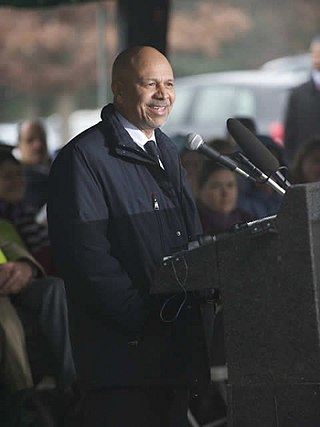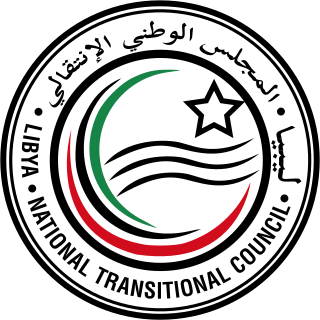
The politics of Libya has been in an uncertain state since the collapse of the Libyan Arab Jamahiriya in 2011 and a recent civil war and various jihadists and tribal elements controlling parts of the country. On 10 March 2021, the interim Government of National Unity (GNU), unifying the Second Al-Thani Cabinet and the Government of National Accord was formed, only to face new opposition in Government of National Stability, until Libyan Political Dialogue Forum assured the ongoing ceasefire.

Muammar Muhammad Abu Minyar al-Gaddafi was a Libyan revolutionary, politician and political theorist who ruled Libya from 1969 until his assassination in 2011 by rebel forces. He first served as Revolutionary Chairman of the Libyan Arab Republic from 1969 to 1977 and then as the Brotherly Leader of the Great Socialist People's Libyan Arab Jamahiriya from 1977 to 2011. Initially ideologically committed to Arab nationalism and Arab socialism, Gaddafi later ruled according to his own Third International Theory.

The Third International Theory was the style of government proposed by Muammar Gaddafi in the early 1970s, on which his government, the Great Socialist People's Libyan Arab Jamahiriya, was officially based. It was partly inspired by Islamic socialism, African nationalism and partly by the principles of direct democracy.

Patrick Francis Kennedy is a former career Foreign Service Officer who served as the U.S. State Department's Under Secretary of State for Management. He was Director of the Office of Management Policy, Rightsizing and Innovation. He has been Deputy Director for Management at the cabinet level Office of the Director of National Intelligence; he returned to the Department of State on May 7, 2007. Kennedy was U.S. Ambassador to the United Nations for Management and Reform and previously served as Chief of Staff for the Coalition Provisional Authority in Iraq. He was the Assistant Secretary of State for Administration for the Clinton Administration from 1993 to 2001. In 2014, Kennedy was elected as a fellow of the National Academy of Public Administration.

Muammar Gaddafi became the de facto leader of Libya on 1 September 1969 after leading a group of young Libyan Army officers against King Idris I in a bloodless coup d'état. After the king had fled the country, the Revolutionary Command Council (RCC) headed by Gaddafi abolished the monarchy and the old constitution and established the Libyan Arab Republic, with the motto "freedom, socialism and unity".

The Libyan–Sudanese relations refers to the long historical relations between Libya and Sudan, both are Arab countries.

The National Front for the Salvation of Libya (NFSL) was a political opposition group active during the rule of the Gaddafi regime in Libya. It was formed in 1981 and called for major liberalising reforms such as democratic elections, a free press, and the separation of powers. During the 1980s, it pursued a campaign of armed opposition to the Gaddafi regime and made several coup attempts, the most notable being its 1984 armed assault on Gaddafi's Bab al-Azizia compound in Tripoli. After the failure of this and several other coup attempts the group largely abandoned militancy, and instead used peaceful tactics to promote reform in Libya; in 2005, the NFSL joined with six other groups to form the National Conference for the Libyan Opposition.

The Kingdom of Libya, known as the United Kingdom of Libya from 1951 to 1963, was a constitutional monarchy in North Africa that came into existence upon independence on 24 December 1951 and lasted until a bloodless coup d'état on 1 September 1969. The coup, led by Muammar Gaddafi, overthrew King Idris and established the Libyan Arab Republic.

Ali Abdussalam Treki was a Libyan diplomat in Muammar Gaddafi's regime. Treki served as one of Libya's top diplomats beginning in the 1970s and ending with the 2011 Libyan Civil War. He was Minister of Foreign Affairs from 1976 to 1982 and again from 1984 to 1986, and he was later the Permanent Representative to the United Nations on several occasions. He was the President of the United Nations General Assembly from September 2009 to September 2010.

Mansour Rashid Kikhia was the Libyan Minister of Foreign Affairs (1972–1973), Libyan Ambassador to the United Nations, Permanent Libyan Representative to the United Nations (1975–1980), and later an opposition figure to Libya's leader Muammar Gaddafi, and human rights activist.

Ali Suleiman Aujali is a Libyan diplomat who formerly served successively as Libya's ambassador to Malaysia, Argentina, Brazil and the United States. He served as ambassador under the Gaddafi government, Libya's National Transitional Council, and Libya's General National Congress. He declined the post of foreign minister under Prime minister Ali Zeidan in the government of the General National Congress.

The anti-Gaddafi forces, also known as the Libyan opposition or Libyan rebels, were Libyan groups that opposed and militarily defeated the government of Muammar Gaddafi during the First Libyan Civil War in 2011, killing him in the process. The Anti-Gaddafi forces were represented by the National Transitional Council and their National Liberation Army, which claimed to be the "only legitimate body representing the people of Libya and the Libyan state". These opposition forces included organized and armed militia groups, participants in the Libyan Civil War, Libyan diplomats who switched their allegiance from the Gaddafi-led government, and Libyan military units that switched sides to support the protestors.
Khamis Gaddafi was the seventh and youngest son of former Libyan leader Muammar Gaddafi, and the military commander in charge of the Khamis Brigade of the Libyan Army. He was part of his father's inner circle. During the Libyan Civil War in 2011, he was a major target for opposition forces trying to overthrow his father.

Field Marshal Khalifa Belqasim Haftar is a Libyan politician, military officer, and the commander of the Tobruk-based Libyan National Army (LNA). On 2 March 2015, he was appointed commander of the armed forces loyal to the elected legislative body, the Libyan House of Representatives.

From 1969 to early 2011, the politics of Libya were determined de facto by Muammar Gaddafi, who had been in power since his overthrow of the Kingdom of Libya in 1969.

The aftermath of the 2011 Libyan civil war has been characterized by marked change in the social and political order of Libya after the overthrow and killing of Muammar Gaddafi in the civil war that was fought in Libya in 2011. The country has been subject to ongoing proliferation of weapons, Islamic insurgencies, sectarian violence, and lawlessness, with spillovers affecting neighboring countries including Mali.

Mohammed Yousef el-Magariaf or, as he writes on his official website, Dr. Mohamed Yusuf Al Magariaf, is a Libyan politician who served as the President of the General National Congress from its first meeting in August 2012 until his resignation in May 2013. In this role he was effectively Libya's de facto head of state, until his resignation in May 2013.

Mustafa A. G. Abushagur is a Libyan politician, professor of electrical engineering, university president and entrepreneur. He served as interim Deputy Prime Minister of Libya from 22 November 2011 to 14 November 2012 in Abdurrahim El-Keib's cabinet and was briefly elected to succeed El-Keib as Prime Minister in 2012, before failing to receive congressional approval for his cabinet nominees and being removed from office.

Mohammed Ali Abdallah Addarrat is a Libyan political activist. Serves as Senior Advisor to the Libyan Government of National Accord for US Affairs.
The National Front Party is a political party in Libya, formed in May 2012. It is the successor to the National Front for the Salvation of Libya, an anti-Gaddafi resistance movement founded in 1981. Its ideology is considered liberal and progressive, and Libya Herald writer George Grant described the party as "arguably the most liberal-leaning of all in Congress."















